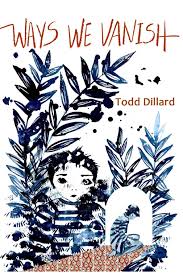ISSN: 1941-4137
POETRY THAT ENACTS THE ARTISTIC AND CREATIVE PURITY OF GLASS
POETRY THAT ENACTS THE ARTISTIC AND CREATIVE PURITY OF GLASS

Sara Pisak is a Contributing Editor at Helen: A Literary Magazine and a Staff Reviewer at Glass Poetry Press. Sara participates in the Poetry in Transit Program and has recently published work in the Deaf Poets Society, Five:2:One Magazine, Glass Poetry, Moonchild Magazine, Yes Poetry, PA Bards, Mookychick, and Boston Accent. When not writing, Sara can be found spending time with her family and friends. You can follow her writing adventures on Twitter: @SaraPisak10.
September 10, 2020
Edited by Stephanie Kaylor
Edited by Stephanie Kaylor
Review of Ways We Vanish by Todd Dillard

Ways We Vanish
Todd Dillard
Okay Donkey Press, 2020
At the beginning of Ways We Vanish(Okay Donkey Press, 2020), Todd Dillard asks, “What is grief?” This question subsequently guides the reading of the text. The poems enclosed, within the collection, illuminate that grief is unable to be defined by a singular aspect. Instead, grief both fills and empties; it divides and unifies; grief is the ability to move forward while looking back; it is both something to vanish into and emerge from with a better understanding.
Dillard interrogates grieving through the exploration of diverse forms and subject matters. He discusses the lone Mars Rover which sings happy birthday to itself daily; he nods towards science fiction with a magical wooden door and monsters learning about adulthood; and he presents an autobiographical account of his life. Shining through these topics is Dillard’s invocation of memories where he shares intimate details of his life.
Recently losing his mother and coping with his father’s medical issues, the speaker reminisces about childhood. In the poem, “Interview with an Addict’s Son,” he remembers the haunting affect his mother’s drug use had on him as a child. Dillard writes:
[…] how to help
when you’re feeling mischievous
draw those chalk lines around her
how to say when do you think she will wake up
or die in a way that says I love you
and am willing
to approach your edges
Willing to write about the pointed edges in one’s relationship with his mother, the honesty in this voice is striking. The fear of losing his mother and drawing a chalk outline around her is palpable. As a boy, the speaker remembers trying to save his mother, and as an adult he fashions these poems as a tribute to save the memory of her. In writing about these deeply personal memories, Dillard allows his mother to live through his work.
Exploring the family unit, Dillard not only dissects the speaker’s mother’s drug addiction and the effect it had on his childhood, but he also examines the quintessential family moments. In doing so, Dillard examines what it means to be connected to others. What does it mean to be a son, a father, a mother, or a brother? How does the loss of one of these individuals or the complicatedness of their actions affect our personhood? In the poem, “Up and Down the Ladder,” Dillard writes:
[…] Should I mention how good I’ve gotten at being dead?
Today three powerline crows watch my daughter on our back porch
as she traced my body in chalk
and I became my best corpse again,
and when we shambled inside for dinner
they swooped down and pecked my silhouette, flying away when there was
no scratch of me to eat.
I thought: The dishes can wait another night.
I thought: Ah. She drew me wings.
Giving readers an insight into his personal connection to others, Dillard gives an answer to the question he first posed. Our life is a summation of everyday moments and traumatic instances. Grief may never leave us, but it accompanies us on our journey. The death of those we love follows us like scavenging birds, as those we love and those who loved us shape our existence long after they have left. The speaker’s daughter draws a chalk outline around him like he feared he would be forced to do for his mother. As a result, his daughter refashions the speaker’s previously scarring memory, giving his life new meaning; she pulls him from the depth of grief and from feeling dead, drawing him back into these beautifully common, everyday moments.
These private instances are what makes Ways We Vanish sincere and universal. Dillard’s poems will make a reader feel closer to those they love and still connected to those they lost. As Dillard writes, “Let the lyrics of my soul be the name of those I love.”
Visit Todd Dillard's Website
Visit Okay Donkey Press' Website
Glass: A Journal of Poetry is published monthly by Glass Poetry Press.
All contents © the author.
All contents © the author.





